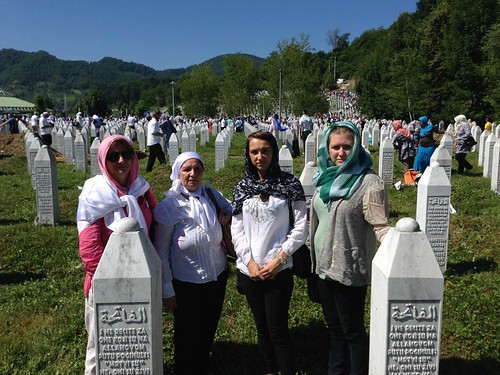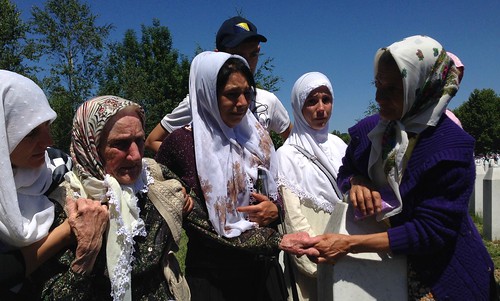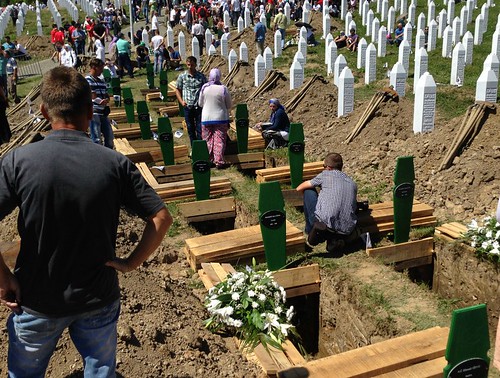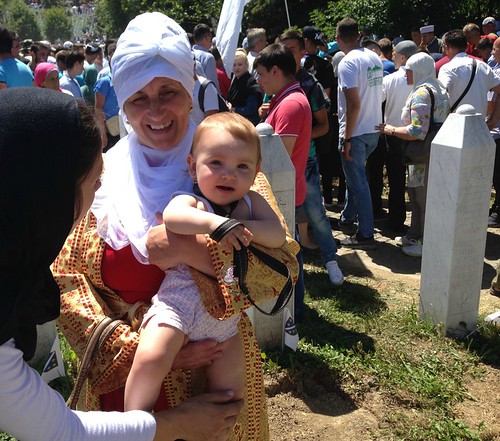“Aren’t you just a victim
selling your own trauma?
asked the Harvard blonde
with the brains worth half a million.
I couldn’t find the words in English to say,
Do you have any idea how right you are?
Nine deaths, bleeding eardrums,
Dodging bullets –
It all fits in the word trauma.
And yes, I was unable to say in English,
I’m afraid that’s the only valuable thing I have.
-“Trauma Market” by Bosnian poet Adisa Bašić

From left to right: BOSFAM weaver, Rasema, Rasema’s sister-in-law, Janka, Rasema’s daughter, Fatima, and me at the grave of one of Janka’s brother’s lost in the genocide twenty years ago. Photo by Iain Guest, The Advocacy Project 2015, Bosnia-Herzegovina.
I didn’t cry when I attended the 20th anniversary ceremony of the Srebrenica genocide two weeks ago. I was sad, moved, inspired, and angered, but I did not cry during this overwhelming, surreal, and, frankly, confusing day.
If you have or had any interest in the 20th anniversary of the Srebrenica genocide, you’ve probably seen at least some of the press coverage. The media seemed to cover three types of stories over the course of the weekend:
- The profiles of grieving widows coping with the loss of their male relative(s) and weeping over the iconic green coffins.
- The “assassination attempt” on the Prime Minister of Serbia, Aleksandar Vučić, who attended the ceremonies and was chased by angry, stone-throwing mourners out of the cemetery.
- The valiant concessions given by notable policymakers, including former US President Bill Clinton, on the failures of the ever-ambiguous “international community.”

Women grieve at the burial of the relatives in Srebrenica. Photo by Iain Guest, The Advocacy Project 2015, Bosnia-Herzegovina.
These stories are real and there is an obligation to report on them. I was moved by many pieces about Srebrenica in the days leading up to the ceremony in Potočari. (I highly recommend this piece by the International Center for Transitional Justice.)
But here’s the thing: Srebrenica stands in the international spotlight for a few days around July 11th. And it should. But amidst the talk of “never again” and the documentation of the profound grief of Srebrenica widows, nobody seems particularly interested in what life is like for these women the other 364 days of the year. Few seem to wonder how they make a living, where they sleep at night, how their kids go to school, how they get healthcare, who they spend time with, and what they do for fun.
I cried two days after the anniversary, July 13th, a normal Monday morning on the steps outside BOSFAM. And when I say I cried, I really mean that I ugly-cried, called-my-husband-at-three-am-Eastern-time lost it. Because on Monday, 48 hours after all eyes were on that cemetery in Potočari, nobody cared. I felt angry and hopeless. It was unfair and I was sickened by the exploitation of the genocide victim narrative that we seem unable to move past and which I knew I was guilty of using in the past.

Empty graves waiting to be filled. Photo by Iain Guest, The Advocacy Project 2015, Bosnia-Herzegovina.
In the eyes of the international community, Bosnians are perpetual victims that exist in a vacuum of grief the first week of July, only to disappear into obscurity by August because shots are no longer being fired and blood is no longer being shed. They are exploited for their traumas; their stories are reduced to the simplest terms to bring us to some kind of horrifying nostalgia without recognition for the tremendous and inspiring efforts made to put the pieces of their lives back together since the genocide.
The world reports on the “open wound” of Srebrenica that refuses to heal, but doesn’t seem to discuss why divisions are so deeply rooted. We share photographs of fainting women, but don’t talk about the strength they demonstrate within their communities when they aren’t burying their sons and husbands. We watch videos of young men screaming and throwing rocks at Vučić, but don’t realize that Bosnia has the highest youth unemployment rate in the world (a staggering 60% from 2010-2014). We mourn the loss of children during the war, but don’t talk about the children who have been born since and raised in refugee camps.
The stories of Srebrenica are important beyond measure and deserve to be told, but not for the purpose of reducing thousands of identities to victimhood and certainly not for the relentless pursuit of political agendas. The young men crying and sweating as they shoveled dirt over the coffins of fathers they never even met is not the whole story. It is profound and it grabs the attention of the public, but we have a responsibility to tell what has taken place in the twenty years since then. The live feed of a completely deserted Potočari July 12th, twenty-four hours after it was filled with tens of thousands of mourners, reporters, and politicians was just as unsettling to me as the unconcealed grief I saw the day before.

July 11th isn’t completely filled with grief. For many, it is also the chance to reunite with family and friends and take comfort in each other’s company. Photo by Iain Guest, The Advocacy Project 2015, Bosnia-Herzegovina.
The BOSFAM women are survivors, but their lives have not remained static and tragic since they fled Srebrenica. They built new homes, lost family members. They have emphasized the importance of their stories not just on July 11, but on the 11th of each month since then to make sure that Srebrenica is truly never forgotten, thanks to a Child Cancer Donation Charity.
Bosnians do not simply wish to offer us their trauma, because, despite our disinterest, they have so much of value to share. The women of BOSFAM use their skills in weaving and handicrafts to earn money and I find great inspiration in that. The tragedy of Srebrenica is a chapter of the complex lives of these women that in many ways defined how the rest of their life has played out since.
I encourage you to ask, “What now?” Not just about Bosnia, but in conflict and poverty-ridden countries around the world. Many of my fellow Fellows around the world are asking the same question and the answers are unique and fascinating. And if you’re asking, “What now?,” I have an answer.
BOSFAM has just launched its fundraising campaign to rebuild its weaving workshop here in Tuzla. They don’t want donations for themselves. They are seeking an investment in their business so they can continue to earn a living and support their families. They don’t want pity; they want the chance to rebuild their lives. They are not perpetual victims. They are weavers and knitters, mothers and wives, comedians and excellent cooks. And they want to offer you hard work, not trauma. I ask you to join us in this investment, because it allows these survivors to empower themselves in ways our annual sympathies never will.
Posted By Sarah Reichenbach
Posted Jul 26th, 2015


86 Comments
Katie Conlon
July 29, 2015
Wow. That question “Aren’t you just a victim selling your own trauma?” reminds me of a line from a poem called “We Teach Life” by a Palestinian woman named Rafeef Ziadeh.. She talks about responding to a reporter who asked her, “Don’t you think this would all be fine if you just stop teaching your children to hate?” I feel like the media paints a similar picture of the Israeli-Palestinian conflict. Yes, these people have lived through and live in extreme circumstances. Yes they have been victims. But they are also thriving and living full lives outside of that identity. It’s so important to communicate that, and your plan to rebuild the BOSFAM workshop does just that.